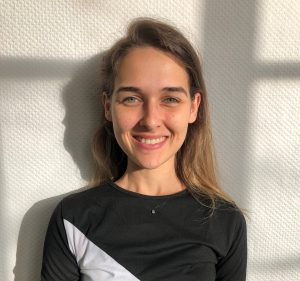What is your main research interest? I am interested in children’s lifestyle patterns (i.e., combination of diet, screen, physical activity and sleep), their relations to family contextual factors but also with physical health and socio-emotional development in both the general and homeless population.
How do you explain your current research/job to friends and family?
The way I explain my research to my friends and family finds its origin in the first seminar of the doctoral network to which I belong. We were asked to prepare an oral communication “If my research was an object”. Each student had to bring an object, from which he explained his research topic in 3 minutes in front of an audience of non-specialists, a bit like the format of “my thesis in 180 seconds”. I chose the Russian dolls:
“The traditional Russian doll (or matryoshka) is a hollow wooden figurine, which opens horizontally, in which are nested replicas of the first one (shape, color, decorations). For starters, let’s say we have two embedded dolls: the bigger one, the “children EBRBs” doll, represent children energy balance related behaviors combined (EBRBs) – i.e., diet, screen, physical activity, sleep – and is hypothesized to influence the smaller one: the “children physical and psychosocial health” doll. According to Mr. Bronfenbrenner, EBRBs are developed within specific contexts, the familial one being of major importance for young children. Thus, more dolls of bigger sizes are necessary to surround the “EBRBs” one. The Russian dolls are of course of different colors and decorations, so as the family environments in which the children grow up. The aim of my research is to identify which characteristics (colors and decorations) at each family sphere (“surrounding” dolls) foster or hinder children’s lifestyle patterns (“children EBRBs” doll), and how such patterns influence their well-being and health (“children physical and psychosocial health” doll – quite a long name just for a doll).”
What’s something you have learnt about your research or yourself that was unexpected?
I think the most important thing I’ve learned is how important self-confidence is in the research field. Of course, having small self-doubt is a good thing. A small amount of self-doubt pushes us to do better and be better. Nevertheless, impostor syndrome is characterized by constant self-doubt that leads to unrealistic assessment and beliefs about our (i.e., those of all PhD students) abilities. Dealing with my impostor syndrome was so far a challenge for me (and still is, a little bit).
It has been a year now since I have begun this whole PhD adventure and I am fully aware that acquiring self-confidence is a non-linear continuous process, yet I have already came with some strategies to present myself, speak and think more confidently, as well as how to be more positive and optimistic which allowed me to effectively (I believe) network and interact with others within and outside my organization.
Given unlimited funding, what would your dream research project be?
Observational studies conducted in children’s lifestyle patterns, as the ones conducted or that will be conducted during my PhD, are a fundamental part of epidemiological research. They give some indications for future prevention programmes that are worth evaluating, from a lifecourse perspective. Without financial constraints, I would love to launch a study to evaluate the efficacy of an international ethical intervention that would address different levels of influence on children’s health, not only considering the influence of the family sphere but also the societal and community ones, which might influence lifestyle patterns development as well. Addressing structural barriers are, indeed, keys in health promotion and prevention.
Contact
If you would like to get in touch with Alexandra, you can do so via email [email protected], Twitter @ADescarpentrie, or LinkedIn Alexandra DESCARPENTRIE


